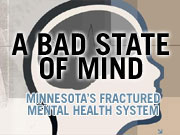|
Audio
Photos
Your Voice
|
Shortage of psychiatrists makes bad problem worse
February 13, 2004
 |
| Jennifer Roberts, left, and Megan Shaffer, right, are psychiatric residents at the University of Minnesota. They're two of a relatively few number of med students choosing to specialize in psychiatry. (MPR Photo/David Molpus) |
Minneapolis, Minn. — Eric Brown and Susan McCarthy are psychiatric residents at the University of Minnesota medical school. During a break in rounds last week, they were discussing the interaction between smoking and various medications for schizophrenia.
It's the kind of eager conversation that goes on constantly among these young doctors who see a lot of opportunity in psychiatry. One thing is for sure, none of them is likely to have trouble finding a job.
"There is a great need all over the country, not just in Minnesota," says Megan Shaffer, who is in her fourth year of training to become a psychiatrist.
 | |||
She is the chief resident. Shaffer and other psychiatric residents will be in high demand because med schools are training fewer and fewer doctors for psychiatric practice. The trend has been a steady one in Minnesota, and nationwide, for a decade now.
Part of the problem, these residents say, is that the mentally ill as well as the those who treat them remain stigmatized to some extent. Psychiatric resident Eric Brown says the general public often doubts whether most people under psychiatric care truly have diseases of the mind. He says that makes being a psychiatrist seem less scientific to the scientifically-minded medical student population.
"The stigma of psychiatrists is we are treating people who aren't really ill -- people who are just worried, weak, can't handle typical problems of living," says Brown.
This false impression, as Brown calls it, is compounded by another misperception -- that psychiatry is mainly talk therapy. Today it is far more pharmacologically-based -- drug therapy is the dominant model. In any case, the perceptions reduce the appeal of psychiatry as a medical specialty. Brown says it makes the field seem more like hand-holding and social work.
|
The stigma of psychiatrists is we are treating people who aren't really ill -- people who are just worried, weak, can't handle typical problems of living.
- Dr. Eric Brown |
On the other extreme, Brown says, there are patients who clearly have lost touch with reality, and they can be really scary to medical students.
"There is a discomfort, even among med students, of dealing with mentally ill folk. People who are in the throes of severe mental illness do act differently," says Brown. "You have to adjust, but some are more willing to make that adjustment than others."
Another disincentive for entering the field of psychiatry is that it is one of the lowest-paying medical specialties, ranking right at the bottom along with family practice and pediatrics.
"It's difficult to be remunerated for services," says Dr. Thomas Mackenzie, psychiatry professor at the U of M.
Mackenzie is in charge of the adult psychiatric training program at the university. He says health insurers have shifted much of the traditional work of psychiatrists to less expensive practitioners, such as psychologists and psychiatric social workers, and access to paid care is in decline.
"Some plans carve out mental health altogether -- no benefits for psychiatric conditions. Others have limited benefits, or plans where only certain providers are acceptable," says Mackenzie.
Within psychiatry, the greatest shortage is among those who treat young children and adolescents. It requires an additional two years of training. With relatively few child psychiatrists in practice, demands on their time can be overwhelming, leading to a very stressful medical career. Jennifer Roberts, another U of M doctor, says she and other psychiatric residents tend to avoid child psychiatry for these and other reasons.
"It's a difficult patient population. You're practicing within the family unit, dealing with a lot more things happening at home that you don't have as much control over -- and that makes it more frustrating," says Roberts. "Dealing with parents, with schools and the other things. It's not as much an issue with adults."
 | |||
With all the negatives -- low pay for psychiatrists, image issues, lack of insurance coverage, difficult patients -- it's not surprising that psychiatry is a shrinking specialty. The consequence, says Jennifer Roberts, is that serious medical needs go unmet.
"Obviously, patients in the community suffer. It's difficult to get followup, especially for those who don't need hospitalization," Roberts says.
With inadequate followup visits, a lot of mental health patients end up in emergency rooms after their condition worsens.
Jennifer Roberts, Megan Shaffer, Eric Brown and Susan McCarthy say despite the negatives, the personal rewards of practicing in this field can be great. Susan McCarthy cites how she felt treating one patient with schizophrenia at a hospital.
"I worked with a patient. There was a stage when (she was) not communicating at all. And we initiated medication therapy, and in four weeks she was able to engage with us -- signs she was getting better -- and that was very encouraging," says McCarthy.
Another resident put his decision to enter psychiatry this way.
"I just had to get over the hump of what others may think of psychiatry. What really matters is -- are you connecting with and helping your patients."
|
News Headlines
|
Related Subjects
|

